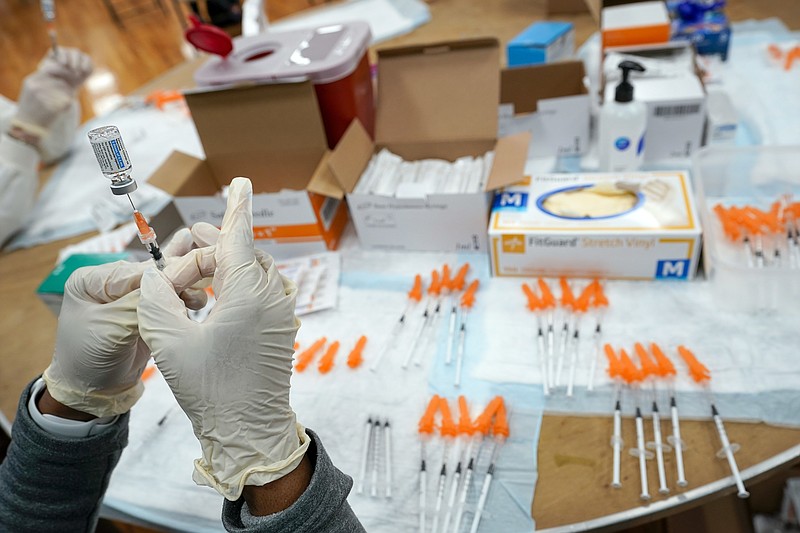U.S. regulators told covid-19 vaccine-makers Thursday that any booster shots tweaked for the fall will have to add protection against the newest omicron relatives.
The Food and Drug Administration said the original vaccines would be used for anyone still getting their first series of shots. But with immunity waning and the super-contagious omicron family of variants getting better at dodging protection, the FDA decided boosters intended for fall needed an update.
The recipe: Combination shots that add protection against the omicron relatives named BA.4 and BA.5 to the original vaccine. Those mutants together now account for just over half of new U.S. infections.
It's still a gamble as there's no way to know if an omicron relative still will be a threat as cold weather approaches or if a newer mutant will take its place. And the current Pfizer and Moderna vaccines still offer strong protection against covid-19's worst outcomes as long as people have gotten already recommended boosters.
But the combination approach, what scientists call "bivalent" shots, would allow the boosters to retain the proven benefits of the original vaccine while adding to its breadth of protection. It's a common vaccine strategy: Flu shots, for instance, can protect against four influenza strains and are tweaked annually depending on what's circulating.
The FDA's decision comes after its scientific advisers earlier this week recommended that any boosters for a fall campaign should contain some version of omicron -- but left undecided whether it should be the omicron mutant that caused last winter's surge or the genetically distinct relatives that have replaced it.
Pfizer and Moderna already were brewing and testing boosters updated against the first omicron mutant in anticipation of an October rollout. They found adding the extra protection was safe -- and spurred production of more omicron-fighting antibodies than just getting another dose of today's vaccine.
Pfizer had begun work on another experimental dose to target the newer strains the FDA ultimately settled on.
"We're continuing to collect more data from our study on BA.4/5 and will be in touch as soon as we are ready to submit," Pfizer spokeswoman Jerica Pitts said in an emailed message.
Moderna told the FDA's advisers that switching to the even newer strains now circulating might delay its booster update another month. A company spokeswoman said Moderna plans to submit its vaccine data to regulators.
The FDA's order doesn't guarantee that those combo shots would be offered in the fall. Manufacturers still have to provide key data before the agency decides whether to authorize modified boosters -- and the Centers for Disease Control and Prevention then would have to decide how they're used.
GLOBAL CASES CLIMB
The number of new coronavirus cases rose by 18% in the last week, with more than 4.1 million cases reported globally, according to the World Health Organization.
The U.N. health agency said in its latest weekly report on the pandemic that the worldwide number of deaths remained relatively similar to the week before, at about 8,500. Covid-related deaths increased in three regions: the Middle East, Southeast Asia and the Americas.
The biggest weekly rise in new covid-19 cases was seen in the Middle East, where they increased by 47%, according to the report released late Wednesday. Infections rose by about 32% in Europe and Southeast Asia, and by about 14% in the Americas, the WHO said.
WHO Director-General Tedros Adhanom Ghebreyesus said cases were on the rise in 110 countries, mostly driven by the omicron variants BA.4 and BA.5.
"This pandemic is changing, but it's not over," Tedros said this week during a news briefing. He said the ability to track covid-19's genetic evolution was "under threat" as countries relaxed surveillance and genetic sequencing efforts, warning that would make it more difficult to catch emerging and potentially dangerous new variants.
He called for countries to immunize their most vulnerable populations, including health workers and people over 60, saying that hundreds of millions remain unvaccinated and at risk of severe disease and death.
Tedros said that while more than 1.2 billion covid-19 vaccines have been administered globally, the average immunization rate in poor countries is about 13%.
"If rich countries are vaccinating children from as young as 6 months old and planning to do further rounds of vaccination, it is incomprehensible to suggest that lower-income countries should not vaccinate and boost their most at risk [people]," he said.
According to figures compiled by Oxfam and the People's Vaccine Alliance, fewer than half of the 2.1 billion vaccines promised to poorer countries by the Group of Seven large economies have been delivered.
